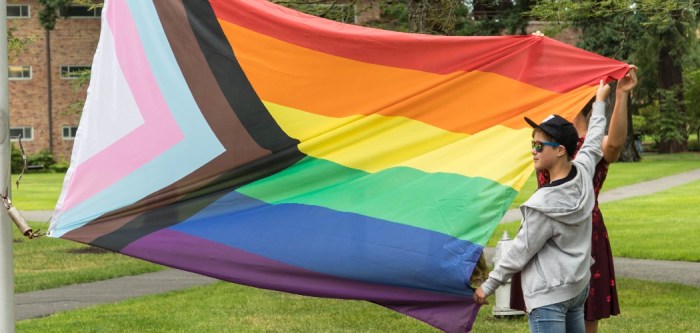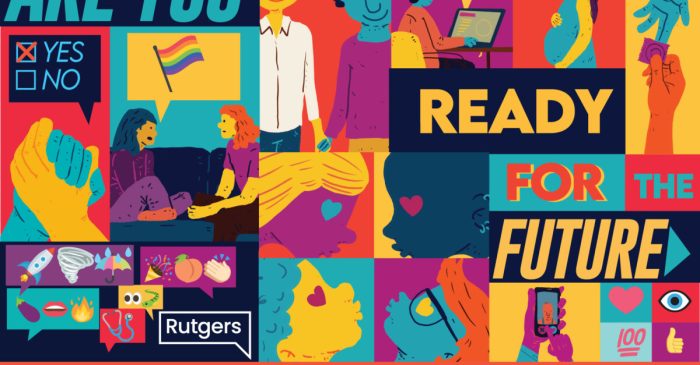Intro to gender race and sexuality rutgers – Delving into “Intro to Gender, Race, and Sexuality” at Rutgers University, this course embarks on an enlightening journey that unravels the intricate tapestry of human identity and social dynamics. Through an interdisciplinary lens, we delve into the profound impact of gender, race, and sexuality on our lived experiences, fostering a deeper understanding of ourselves and the world around us.
Our exploration begins by examining the social construction of gender, unraveling the ways in which societal norms and expectations shape our understanding of masculinity and femininity. We delve into the diverse expressions of gender and the fluidity of gender identities, challenging traditional binaries and embracing a more inclusive spectrum of human experiences.
Course Overview

This course provides an introduction to the study of gender, race, and sexuality. It explores the social construction of these categories, the ways in which they are experienced and expressed, and the relationship between them and power. The course also examines the role of social justice in addressing issues of gender, race, and sexuality.
Expected Learning Outcomes
- Students will be able to define and discuss the social construction of gender, race, and sexuality.
- Students will be able to identify and analyze the different ways that gender, race, and sexuality are expressed and experienced.
- Students will be able to explain the relationship between gender, race, sexuality, and power.
- Students will be able to apply the concepts of gender, race, and sexuality to real-world issues.
- Students will be able to identify and evaluate different forms of activism that can be used to promote social change.
Gender and Society

Gender is a social construct that refers to the roles, behaviors, activities, and attributes that a culture associates with being male or female. Gender is not fixed or binary, but rather exists on a spectrum and can vary across cultures and time periods.
The Social Construction of Gender
Gender is not something that is biologically determined, but rather something that is learned and reinforced through social interactions. From a young age, children are socialized into gender roles through their parents, teachers, peers, and the media. They are taught what it means to be a boy or a girl, and they are rewarded or punished for conforming to or deviating from these expectations.
The Impact of Gender on Society
Gender has a profound impact on our lives. It affects our access to education, employment, healthcare, and other resources. It also affects our relationships with others and our sense of self. Gender inequality is a major social problem that has negative consequences for both women and men.
Race and Ethnicity

Race and ethnicity are social constructs that refer to the ways in which people are categorized based on their physical appearance, ancestry, and cultural heritage. Race is often used to refer to physical characteristics such as skin color, hair texture, and facial features.
Ethnicity refers to cultural characteristics such as language, religion, and customs.
The History of Race and Racism in the United States
The concept of race has been used to justify slavery, colonialism, and other forms of oppression. In the United States, the history of race and racism is particularly complex and has had a profound impact on the lives of African Americans and other people of color.
The Impact of Race on Social and Economic Outcomes
Race has a significant impact on social and economic outcomes in the United States. People of color are more likely to live in poverty, experience unemployment, and be incarcerated than white people. They are also more likely to be victims of discrimination in housing, education, and employment.
Sexuality: Intro To Gender Race And Sexuality Rutgers

Sexuality refers to the ways in which people experience and express their sexual feelings and desires. Sexuality is not limited to sexual intercourse, but also includes other forms of sexual expression such as kissing, touching, and masturbation.
The Social Construction of Sexuality
Like gender, sexuality is a social construct that is learned and reinforced through social interactions. From a young age, children are taught what it means to be heterosexual, homosexual, or bisexual. They are also taught what is considered to be “normal” and “deviant” sexual behavior.
The Impact of Sexuality on Society
Sexuality has a profound impact on our lives. It affects our relationships with others, our sense of self, and our access to healthcare and other resources. Sexual orientation discrimination is a major social problem that has negative consequences for LGBTQ+ people.
Intersectionality
Intersectionality is a theoretical framework that examines the ways in which different forms of oppression intersect to create unique experiences of privilege and disadvantage. Intersectionality recognizes that people’s experiences are shaped by their race, gender, sexuality, class, and other social identities.
The Importance of Intersectionality
Intersectionality is important because it allows us to understand the complex ways in which different forms of oppression interact. It also allows us to develop more effective strategies for addressing these forms of oppression.
Examples of Intersectionality
There are many examples of how intersectionality can be used to understand social issues. For example, intersectionality can be used to understand the experiences of women of color, who face discrimination based on both their race and their gender. Intersectionality can also be used to understand the experiences of LGBTQ+ people of color, who face discrimination based on their race, their sexuality, and their gender.
Social Justice and Activism
Social justice is the idea that all people should have equal access to resources and opportunities, regardless of their race, gender, sexuality, or other social identities. Social justice activism is the work of fighting for social justice.
The Role of Social Justice in Addressing Issues of Gender, Race, and Sexuality
Social justice is essential for addressing issues of gender, race, and sexuality. Social justice activists work to challenge discrimination, promote equality, and create a more just and equitable world.
Different Forms of Activism, Intro to gender race and sexuality rutgers
There are many different forms of activism that can be used to promote social change. Some common forms of activism include:
- Protesting
- Lobbying
- Boycotting
- Educating
- Organizing
Commonly Asked Questions
What are the main themes covered in “Intro to Gender, Race, and Sexuality” at Rutgers?
The course explores the social construction of gender, the history of race and racism in the United States, the diverse expressions of sexuality, and the concept of intersectionality.
How does the course approach the study of gender, race, and sexuality?
The course takes an interdisciplinary approach, drawing on insights from sociology, psychology, history, and cultural studies to provide a comprehensive understanding of these interconnected aspects of human identity.
What are the expected learning outcomes for students who take this course?
Students will develop a critical understanding of the social construction of gender, race, and sexuality, the impact of these factors on social and economic outcomes, and the role of intersectionality in shaping human experiences.